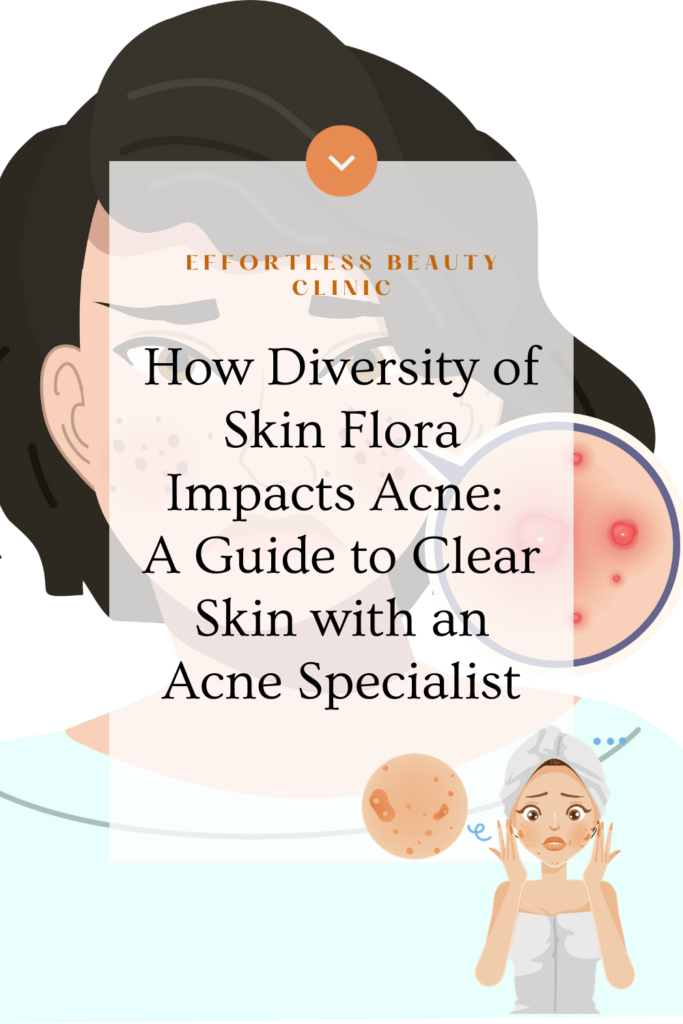The Skin Microbiome: Our Body’s First Line of Defense:
Acne is a common skin concern that affects 85% of all Americans and women of all ages. It can be frustrating, uncomfortable, and embarrassing. Many factors cause acne, but one that many people do not consider is the diversity of skin flora. The human skin is the largest organ of the body, and it plays a crucial role in protecting us from the environment. Protection from the outside environment is actually its number one objective. The skin is home to numerous microorganisms that coexist with us in a mutually beneficial partnership, collectively called the skin microbiome. Let’s explore the significance of skin flora diversity on acne and the role of a skilled esthetician specializing in acne treatment in helping clients achieve acne-free skin.
Acne and Skin Microbiome Imbalance
The skin microbiome comprises many microorganisms, such as bacteria, fungi, viruses, and mites. (Yes, mites! If you have Rosacea, we should speak further on mites.) The diversity of the skin microbiome is crucial to the health of our skin. A balanced skin microbiome can defend against harmful microorganisms, regulate inflammation, and boost the skin’s immune system. However, an imbalanced skin microbiome can lead to skin disorders such as acne.
The Culprit Behind Acne: Cutibacterium acnes (C. acnes)
Acne is caused by an overgrowth of Cutibacterium acnes (C. acnes) on the skin. C. acnes is a significant component of the skin microbiome. However, when uncontrolled, its proliferation can lead to inflammation, pore-clogging, and breakouts. It is crucial to manage the growth of C. acnes to maintain healthy and clear skin. A diverse skin microbiome can help keep the growth of C. acnes in check and prevent acne.
A Holistic Approach to Acne: The Role of an Acne Specialist
An esthetician trained as an acne specialist uses a holistic, clinical-based methodology to treat acne. Unlike dermatologists who merely prescribe antibiotics and hormone blockers, an acne specialist looks at the whole picture of the client’s skin, health, and lifestyle. They understand that clearing acne is not just about applying topical solutions but involves addressing the health of the skin’s microbiome, as well as gut health.
The Gut-Skin Connection: How Diet and Lifestyle Impact Acne
The between gut health and skin health is undeniable. The gut harbors numerous beneficial bacteria essential for overall well-being. An imbalance in gut health can lead to various issues, including acne. An acne specialist thoroughly evaluates the client’s diet, lifestyle, and gut health to address the root cause of acne. Invest in your skin by prioritizing gut health! Find a reliable acne specialist who can guide you toward clearer skin.
Personalized Acne Treatment Plans: What to Expect
Clearing acne by addressing the health of the skin’s microbiome, as well as gut health, can take 8 to 16 weeks, depending on the severity of the acne symptoms. An acne specialist will use a personalized approach to develop a treatment plan that includes proper skin care, diet, lifestyle changes, and other therapies such as light therapy and chemical peels.
The Path to Clear, Healthy Skin
Acne is a challenging condition that can have a significant impact on an individual’s quality of life. Understanding the relationship between skin flora diversity and acne is essential in developing an effective treatment plan. By focusing on the health of the skin and gut microbiome and working with an acne specialist, individuals can successfully manage their acne and restore skin health. With patience, consistency, and an ongoing commitment to healthy living, clear skin can be achievable.
Let’s get started! Set up your new client consultation to begin your own Acne Elimination Program.



Recent Comments